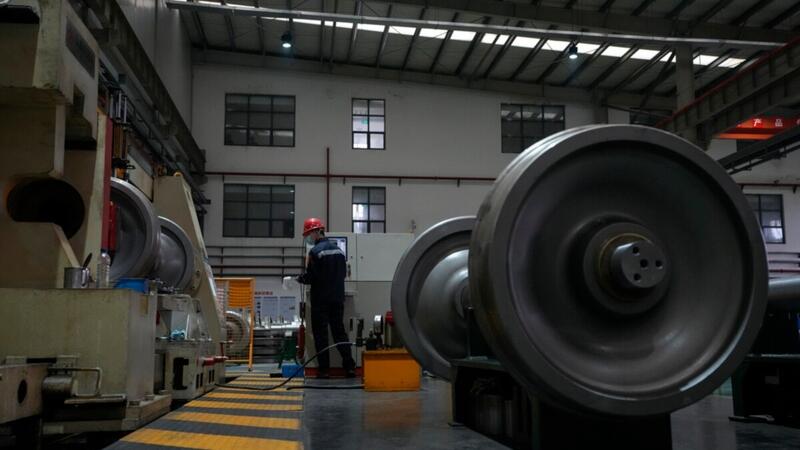BYD's Rise: As Ford's Influence Wanes In Brazil, China's EV Giant Aims For Global Domination

Table of Contents
BYD's Strategic Entry into the Brazilian Market
Targeting a Growing EV Market
Brazil's automotive market is experiencing a surge in demand for electric vehicles, and BYD is perfectly positioned to capitalize on this trend. Several factors contribute to this growing demand:
- Government incentives: The Brazilian government is actively promoting EV adoption through tax breaks and subsidies, making EVs more affordable for consumers.
- Rising fuel prices: Fluctuating fuel prices and the increasing cost of gasoline are pushing consumers towards more economical alternatives like EVs.
- Environmental concerns: Growing awareness of environmental issues and the need for sustainable transportation is driving consumer preference for eco-friendly EVs.
BYD offers a range of models tailored to the Brazilian market, including the BYD Tang SUV and the BYD Han sedan, known for their advanced technology and competitive pricing. While precise market share figures fluctuate, reports indicate a substantial and rapidly growing presence for BYD in the Brazilian EV segment.
Competitive Pricing and Localization Strategies
BYD's success in Brazil isn't solely attributable to the growing EV market; it's also a result of its shrewd business strategies. The company is employing a multi-pronged approach:
- Local manufacturing: Establishing a local manufacturing presence reduces import costs and shipping times, offering price advantages.
- Partnerships with Brazilian suppliers: Collaborating with local suppliers strengthens its supply chain and fosters positive relationships within the Brazilian economy.
- Competitive pricing strategies: BYD's competitive pricing makes its EVs accessible to a broader range of Brazilian consumers.
Beyond competitive pricing, BYD is investing heavily in after-sales service and infrastructure development, addressing a crucial concern for potential EV buyers. A robust service network builds consumer confidence and helps overcome anxieties about owning and maintaining an EV.
Overcoming Challenges in Brazil
Despite its rapid growth, BYD faces challenges in the Brazilian market:
- Charging infrastructure development: Expanding the charging infrastructure nationwide remains a significant hurdle. BYD is actively working with partners to address this limitation.
- Addressing range anxiety: Many potential buyers remain hesitant due to concerns about limited driving range. BYD is promoting its longer-range models and actively working to educate consumers about EV technology and dispel misconceptions.
- Educating consumers about EV technology: Promoting awareness about the benefits of EVs and addressing common misconceptions about their performance and maintenance is crucial for continued growth.
Ford's Declining Presence in Brazil
Reasons for Ford's Retreat
Ford's reduced market share in Brazil reflects broader challenges faced by the automaker globally. Several factors contribute to its decline:
- Economic downturn: Economic instability and fluctuating currency exchange rates have impacted Ford's profitability in Brazil.
- Competition from other automakers: Increased competition from other automakers, both domestic and international, has squeezed Ford's market share.
- Changing consumer preferences: A shift in consumer preferences towards SUVs and smaller, more fuel-efficient vehicles has not been fully met by Ford's offerings in Brazil.
Ford's sales figures in Brazil show a consistent downward trend over the past several years, highlighting the severity of these challenges.
Implications for the Automotive Landscape
Ford's retreat from Brazil has significant implications for the automotive industry:
- Job losses: The closure of Ford's manufacturing plants resulted in job losses and impacted local economies.
- Impact on the supply chain: The withdrawal disrupted the supply chain for numerous parts and components.
- Opportunities for other automakers: Ford's exit created a vacuum, opening up opportunities for other automakers, including BYD, to expand their presence in the Brazilian market.
BYD's Global Ambitions Beyond Brazil
Expansion into Other Key Markets
BYD's success in Brazil is part of a larger global expansion strategy. The company is aggressively pursuing market entry in other key regions:
- Europe: BYD has made significant inroads into several European markets, establishing strong sales and distribution networks.
- North America: BYD is expanding its presence in the United States and Canada, offering a range of electric vehicles to compete with established automakers.
- Asia: BYD continues to dominate the Chinese market and is expanding its presence across other Asian countries.
BYD's approach varies by market, adapting its strategies to the unique characteristics of each region.
Technological Innovation and Leadership
BYD's technological advancements are a significant driver of its global success:
- Blade battery technology: BYD's innovative Blade battery technology offers improved energy density, safety, and range, providing a significant competitive advantage.
- Innovative design features: BYD incorporates cutting-edge design features and technologies in its vehicles, attracting environmentally conscious and tech-savvy consumers.
- Focus on sustainability: BYD's commitment to sustainability and environmental responsibility aligns with the growing global focus on eco-friendly transportation.
Threat to Established Automakers
BYD's rapid growth poses a significant threat to established global car manufacturers, particularly in the rapidly expanding EV sector:
- Market share projections: Analysts predict that BYD will continue to gain significant market share globally, challenging the dominance of traditional automakers.
- Competitive advantage analysis: BYD's vertically integrated business model, encompassing battery production and vehicle manufacturing, provides a cost advantage and control over its supply chain.
- Potential disruption of the industry: BYD's success demonstrates the potential for disruption in the automotive industry, with established players facing increasing pressure from agile and innovative newcomers.
Conclusion
BYD's successful entry into the Brazilian market, coupled with Ford's declining presence, illustrates a significant shift in the global automotive landscape. BYD's strategic approach, technological innovation, and competitive pricing are key factors driving its remarkable growth. Brazil serves as a crucial proving ground for BYD's global expansion strategy, demonstrating its ability to adapt and succeed in diverse markets. The company's aggressive expansion and technological advancements pose a considerable threat to established automakers, making BYD a major force to be reckoned with in the future of the global automotive industry. Follow BYD's global expansion journey and witness the future of electric mobility. Learn more about BYD's innovative electric vehicles and its global strategy by visiting their website.

Featured Posts
-
 Efl Highlights Your Guide To The Best English Football Moments
May 13, 2025
Efl Highlights Your Guide To The Best English Football Moments
May 13, 2025 -
 Tucows Announces New Board Members And Thanks Departing Directors
May 13, 2025
Tucows Announces New Board Members And Thanks Departing Directors
May 13, 2025 -
 Novy Atlas Romskych Komunit Zber Dat V Aprili
May 13, 2025
Novy Atlas Romskych Komunit Zber Dat V Aprili
May 13, 2025 -
 Angel Has Fallen Box Office Success And Critical Reception
May 13, 2025
Angel Has Fallen Box Office Success And Critical Reception
May 13, 2025 -
 Murderbots Existential Crisis A Hilarious Look At Sci Fis Dark Side
May 13, 2025
Murderbots Existential Crisis A Hilarious Look At Sci Fis Dark Side
May 13, 2025
